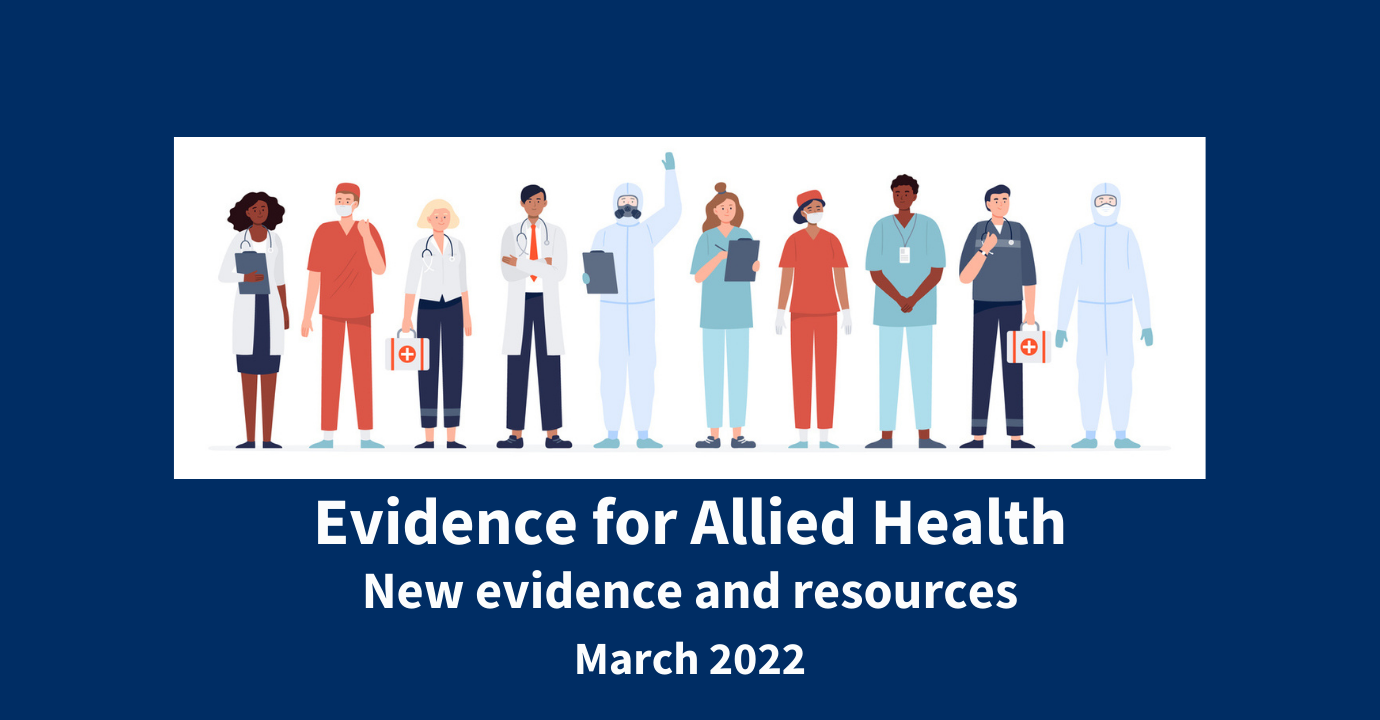The latest evidence and resources for allied health professionals and clinical support staff. You can either scroll through this page or click on any of the links below to jump to the relevant section.
Please note, unlike the rest of our blogs, our ‘Evidence for Allied Health: new evidence and resources’ blogs will not be updated.
- COVID-19
- Blood transfusion
- Cancer
- Cardiovascular disease prevention – sugar consumption
- Chronic obstructive pulmonary disease (COPD)
- Dietary advice for disease-related malnutrition
- Exercise training for adults undergoing maintenance dialysis
- Hip fracture
- Imaging to detect posterior pelvic floor disorders in women with obstructed defaecation syndrome
- Low-carbohydrate versus balanced-carbohydrate diets
- Memory rehabilitation for people with Multiple Sclerosis
- Patient-reported outcome measures feedback
- Smoking cessation
- Stroke
- Trial recruitment
- Urethral catheters
- News and opportunities
1
COVID-19
This year, Cochrane is continuing to produce new and updated reviews in response to the pandemic. We have blogged about many of them and this blog COVID-19 evidence: a Cochrane round-up brings together a large collection of evidence and resources, starting from when this evidence was first being produced in spring 2020. Plus, we have two blogs on COVID-19 treatments: 1) Treatments for mild COVID-19 and 2) Treatments for moderate to severe COVID-19: Cochrane evidence. Like the reviews themselves, all our blogs are updated to reflect new evidence.
Cochrane Special Collections
Cochrane Special Collections assemble Cochrane Reviews on important topics for the prevention and treatment of COVID-19. They are developed with experts from our global Cochrane network. They are based on World Health Organization interim guidance, and continuously updated. You can find Coronavirus (COVID-19) Special Collections here. Those updated in January 2022 include:
- Coronavirus (COVID-19): evidence relevant to critical care
- Coronavirus (COVID-19): infection control and prevention measures.
Cochrane Podcasts
Cochrane COVID-19 Podcasts offer short summaries of Cochrane COVID-19 reviews from the authors themselves. A good way to hear the latest Cochrane evidence in under 5 minutes each. Podcasts released in January 2022 include:
- Which treatments are best for symptoms in COVID-19 patients at the end of life?
- Are corticosteroids (anti-inflammatory medicines) given orally or by injection an effective treatment for people with COVID-19?
Cochrane Clinical Answers
Cochrane Clinical Answers (CCAs) provide a readable, digestible, clinically-focused entry point to rigorous research from Cochrane Reviews. They are designed to be actionable and to inform point-of-care decision-making. Each CCA contains a clinical question, a short answer, and data for the outcomes from the Cochrane Review deemed most relevant to practising healthcare professionals.
You can find Cochrane Clinical Answers related to COVID-19 here.
2
Blood transfusion
- The Cochrane Review Transfusion thresholds for guiding red blood cell transfusion (December 2021) is summarised in this Featured Review article Is it safe to use lower blood counts (haemoglobin levels) as a trigger for blood transfusion in order to give fewer blood transfusions? where you can also listen to a podcast about it.
- Cochrane Clinical Answer: How do restrictive thresholds compare with more liberal thresholds for people requiring red blood cell transfusion?
3
Cancer
- The Cochrane Review Music interventions for improving psychological and physical outcomes in people with cancer was updated in 2021.
- It is included in this Evidently Cochrane blog – Bringing harmony to the hospital: music therapies revisited.
- Podcast: Can music interventions benefit people with cancer?
- Cochrane Clinical Answer: What are the effects of music interventions for improving psychological and physical outcomes among adults with cancer?
4
Cardiovascular disease prevention – sugar consumption
The Cochrane Review High versus low‐added sugar consumption for the primary prevention of cardiovascular disease (January 2022) has found an evidence gap on the impacts of low versus high intake of added sugar on risk factors for cardiovascular disease.
5
Chronic obstructive pulmonary disease (COPD)
Podcast: Integrated disease management for people with chronic obstructive pulmonary disease.
6
Dietary advice for disease-related malnutrition
The authors of the Cochrane Review Dietary advice with or without oral nutritional supplements for disease‐related malnutrition in adults (December 2021) report that “We found no evidence of an effect of any intervention on mortality. There may be weight gain with DA [dietary advice] and with DA plus ONS [oral nutritional supplements] in the short term, but the benefits of DA when compared with ONS are uncertain.” Also that “there were too few data for many outcomes to allow meaningful conclusions.”
7
Exercise training for adults undergoing maintenance dialysis
The Cochrane Review Exercise training for adults undergoing maintenance dialysis (January 2022) has found:
- Exercise training probably improves depressive symptoms, particularly when the intervention is maintained beyond four months.
- Exercise training is also likely to improve functional capacity.
- Exercise training may improve fatigue, the physical component of quality of life, and pain.
- Uncertainty remains about its safety, and its impact (if any) on death, cardiovascular events, or the mental component of health related quality of life.
8
Hip fracture
Following the publication of a suite of Cochrane Reviews, you can read this Interview with authors of Hip Fracture reviews and from there link to the reviews themselves.
9
Imaging to detect posterior pelvic floor disorders in women with obstructed defaecation syndrome
Cochrane Clinical Answers:
- What is the accuracy of evacuation proctography (EP), dynamic magnetic resonance imaging (MRI) and transperineal ultrasound (TPUS) for the detection of intussusception in women with obstructed defecation syndrome (ODS)?
- What is the accuracy of evacuation proctography (EP), dynamic magnetic resonance imaging (MRI) and transperineal ultrasound (TPUS) for the detection of rectocele in women with obstructed defecation syndrome (ODS)?
10
Low-carbohydrate versus balanced-carbohydrate diets
A Cochrane Review Low‐carbohydrate versus balanced‐carbohydrate diets for reducing weight and cardiovascular risk (January 2022) has found that, both in people with and people without Type 2 diabetes:
- “There is probably little to no difference in the weight lost by people following low-carbohydrate weight-reducing diets (also known as ‘low-carb diets’) compared to the weight lost by people following balanced-carbohydrate weight-reducing diets, for up to two years.
- Similarly, there is probably little to no difference between the diets for changes in heart disease risks, like diastolic blood pressure, glycosylated haemoglobin (HbA1c, a measure of blood sugar levels over 2-3 months) and LDL cholesterol (‘unhealthy’ cholesterol) up to two years.”
You can read more about it in this article Featured review: Low-carbohydrate versus balanced-carbohydrate diets for reducing weight and cardiovascular risk.
11
Memory rehabilitation for people with Multiple Sclerosis
Cochrane Clinical Answer: In people with multiple sclerosis, what are the effects of memory rehabilitation?
12
Patient-reported outcome measures feedback
Cochrane Clinical Answer: How does feedback to people receiving care and/or healthcare professionals of patient‐reported outcome measures (PROMs) impact outcomes of care?
13
Smoking cessation
The bottom line of the new Cochrane Review Heated tobacco products for smoking cessation and reducing smoking prevalence (January 2022) is that “heated tobacco probably exposes people to fewer toxins than cigarettes, but possibly more than not using any tobacco.” “No studies reported on cigarette smoking cessation, so the effectiveness of heated tobacco for this purpose remains uncertain.”
14
Stroke
Cochrane Clinical Answer: For adults post stroke, how does more time spent in rehabilitation impact outcomes?
15
Trial recruitment
16
Urethral catheters
Cochrane Clinical Answers:
- For adults with short‐term indwelling urethral catheters, how does clamping compare with free drainage?
- For adults with short‐term indwelling urethral catheters, what are the effects of prophylactic alpha blockers?
17
News and opportunities
Research integrity
Read about Research integrity: making sure medical trials reported in the scientific literature are real.
Challenging misinformation
In this free Lifeology course, you can learn what you can do to slow and prevent the spread of misinformation: What is an infodemic and how can we prevent it?: a Lifeology and Cochrane collaboration.
Trusted information needs to be protected on social media as much as misinformation needs to be challenged. Read about the recent removal of Cochrane’s Instagram post and shadowban which highlight the realities of Cochrane’s call against misinformation.
Call to action
Millions of lives could be saved if health evidence and communication is put at forefront of pandemic preparedness. The New Cochrane Convenes report recommends urgent action among those who fund, generate and use evidence to ensure the world is better prepared.
In a call to action, Cochrane is “encouraging other organizations who produce, use, fund or communicate about evidence to join us and support the call to action as a way of helping spread the recommendations further and acting on them”.
“If you lead or are part of an organization, please consider supporting the call to action, or encourage leadership to do so. If you are not affiliated with an organization, you can help by asking your local political leaders, research funders and institutions to support the call to action and by spreading the recommendations.”
Please note that this page includes a round-up of materials mainly published within the last two months, and is not updated after it’s posted.
Join in the conversation on Twitter with @SarahChapman30 and @CochraneUK or leave a comment on the blog.
Please note, we cannot give medical advice and do not publish comments that link to individual pages requesting donations or to commercial sites, or appear to endorse commercial products. We welcome diverse views and encourage discussion but we ask that comments are respectful and reserve the right to not publish any we consider offensive. Cochrane UK does not fact check – or endorse – readers’ comments, including any treatments mentioned.
Sarah and Selena have nothing to disclose.



Fascinating insights on the latest evidence for allied health! This blog provides valuable resources for healthcare professionals seeking to enhance patient care. Kudos to the authors for their dedication to evidence-based practice. 💯📚